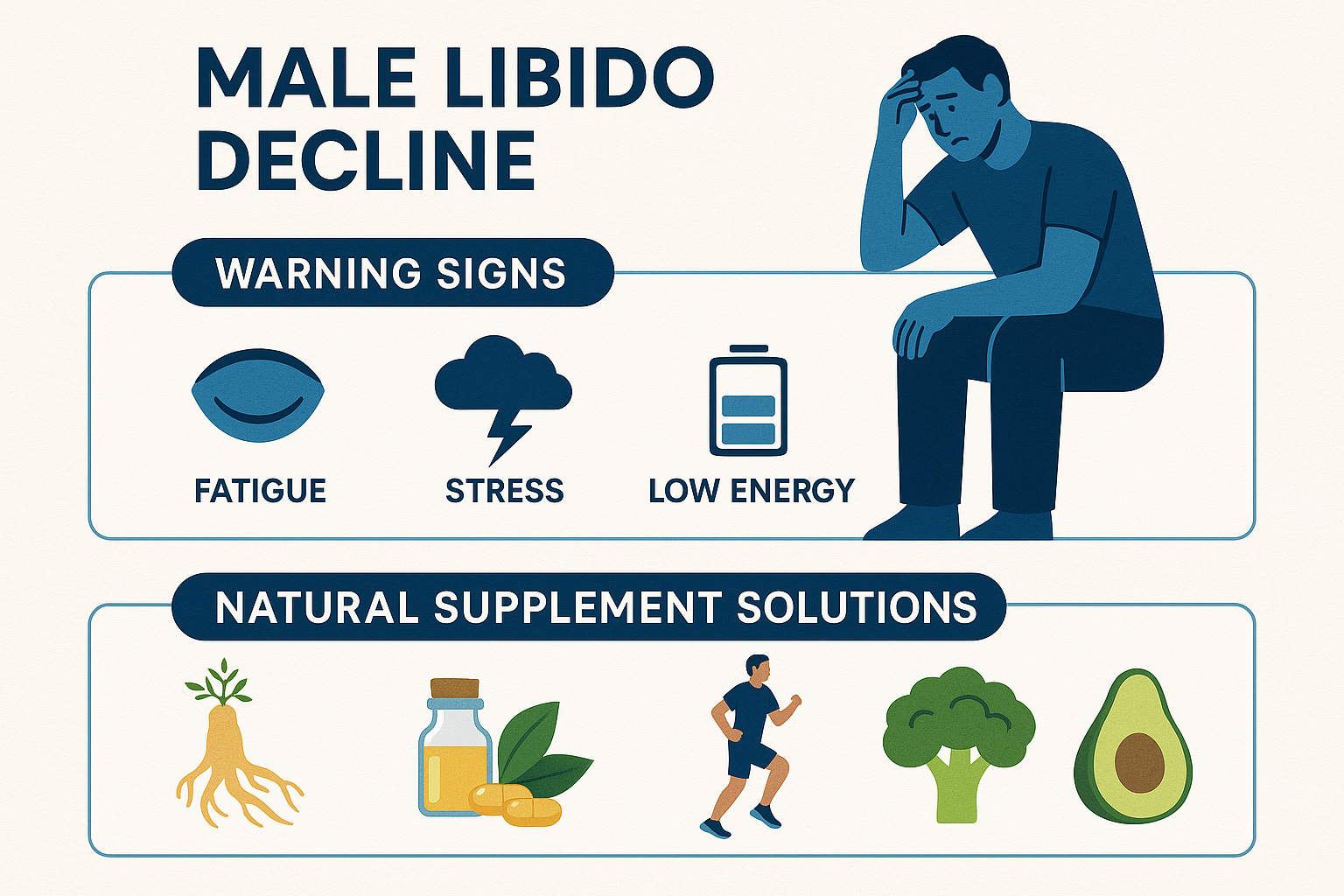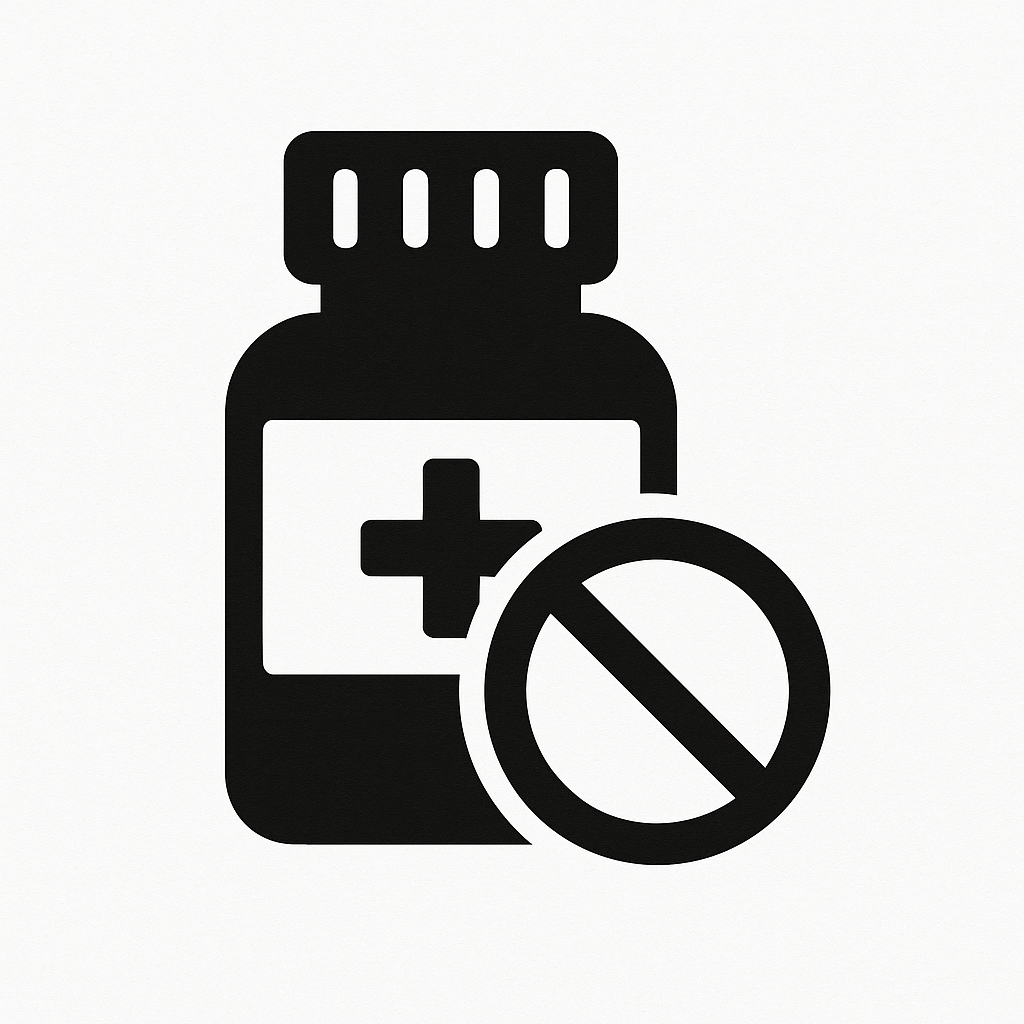
Is Male Libido Declining? Warning Signs & Natural Supplement Solution
The subject of male sexuality has long been shrouded in silence, but recent research reveals a troubling trend that demands attention. Studies indicate that testosterone levels in men have been declining by approximately one percent per year over the past several decades, and with it, male libido appears to be following suit. This isn't just about aging—younger men are experiencing decreased sex drive at rates never seen before, prompting health experts to sound the alarm about what some are calling a modern epidemic of diminished male vitality.
Understanding whether you're experiencing a genuine decline in libido versus normal fluctuations is crucial for addressing the issue effectively. More importantly, recognizing the warning signs early can help you take proactive steps before the problem significantly impacts your relationships, mental health, and overall quality of life.
Understanding Male Libido: More Than Just Sex Drive
Before diving into warning signs and solutions, it's essential to understand what libido truly encompasses. Male libido isn't simply about wanting sex—it's a complex interplay of biological, psychological, and social factors that influence sexual desire, arousal, and satisfaction.
At its core, libido is driven by hormones, particularly testosterone, which plays a pivotal role in maintaining sexual interest and function. However, neurotransmitters like dopamine and serotonin, blood flow, mental health, stress levels, relationship dynamics, and lifestyle factors all contribute to the intricate web of male sexual wellness.
A healthy libido manifests as spontaneous sexual thoughts, responsiveness to sexual stimuli, interest in initiating or responding to sexual activity, and overall satisfaction with one's sex life. When these elements begin to diminish consistently over time, it may signal an underlying issue that warrants attention.
The Warning Signs: Is Your Libido Declining?
Recognizing the warning signs of declining libido is the first step toward addressing the issue. While occasional fluctuations in sex drive are normal and often tied to stress or temporary circumstances, persistent changes may indicate a more significant problem.
Decreased Sexual Thoughts and Fantasies
One of the earliest indicators of declining libido is a noticeable reduction in spontaneous sexual thoughts. If you find yourself rarely thinking about sex or no longer experiencing sexual fantasies that once came naturally, this could be a red flag. Many men report that they simply "don't think about it anymore" without realizing this represents a significant shift from their baseline.
Reduced Interest in Initiating Intimacy
When you consistently find yourself avoiding opportunities for sexual intimacy or making excuses to postpone sexual activity, it may signal declining desire. This isn't about occasionally being too tired after a long day—it's about a persistent pattern of disinterest that represents a departure from your normal behavior.
Difficulty with Arousal and Responsiveness
While erectile dysfunction is a separate issue, difficulty becoming aroused even when you want to engage in sexual activity can indicate libido problems. This includes reduced responsiveness to sexual stimuli that previously excited you, whether visual, physical, or mental.
Emotional Distance in Relationships
Declining libido often manifests as emotional withdrawal from romantic partners. You might notice decreased physical affection beyond sex, such as less kissing, cuddling, or intimate conversation. This emotional distance can create a concerning feedback loop that further diminishes desire.
Changes in Morning Erections
Healthy men typically experience morning erections several times per week due to natural testosterone fluctuations during sleep. A significant decrease or absence of morning erections can indicate hormonal imbalances affecting libido.
Increased Irritability and Mood Changes
Low testosterone and declining libido often coincide with mood disturbances, including irritability, depression, anxiety, and decreased motivation. These psychological symptoms can both result from and contribute to reduced sexual desire.
Fatigue and Low Energy
Persistent fatigue that doesn't improve with rest can signal hormonal imbalances affecting both energy levels and libido. When you're constantly exhausted, sexual activity naturally becomes a lower priority.
Loss of Confidence and Self-Esteem
Declining libido frequently impacts how men perceive themselves, leading to decreased confidence in sexual situations and general self-esteem issues. This psychological component can perpetuate the problem, creating a cycle that's difficult to break without intervention.
Root Causes: Why Is Male Libido Declining?
Understanding the underlying causes of libido decline is essential for finding effective solutions. While the factors are often interconnected, identifying specific contributors in your situation can guide treatment approaches.
Hormonal Imbalances
Testosterone decline is perhaps the most well-known cause of reduced libido. After age thirty, testosterone levels naturally decrease by about one percent annually, but lifestyle factors, chronic illness, medications, and environmental toxins can accelerate this decline. Beyond testosterone, imbalances in thyroid hormones, cortisol, and prolactin can also suppress sexual desire.
Chronic Stress and Cortisol
Modern life bombards men with chronic stressors that elevate cortisol levels. High cortisol directly suppresses testosterone production and redirects the body's resources away from reproductive functions toward survival mode. The persistent activation of stress responses leaves little room for sexual interest.
Poor Sleep Quality
Sleep deprivation and poor sleep quality significantly impact testosterone production and overall hormonal balance. Most testosterone production occurs during sleep, so chronic sleep problems can create a hormonal environment hostile to healthy libido.
Nutritional Deficiencies
Deficiencies in key nutrients like zinc, magnesium, vitamin D, and B vitamins can impair hormone production and sexual function. Modern diets often lack these essential nutrients, contributing to widespread deficiencies that affect male vitality.
Sedentary Lifestyle and Obesity
Physical inactivity and excess body fat, particularly abdominal fat, create a cascade of negative effects on sexual health. Adipose tissue converts testosterone to estrogen, while sedentary behavior reduces testosterone production and circulation. This combination significantly dampens libido.
Medications and Substances
Numerous common medications can suppress libido, including antidepressants (particularly SSRIs), blood pressure medications, opioids, and finasteride. Additionally, excessive alcohol consumption, marijuana use, and recreational drugs can all negatively impact sexual desire and function.
Psychological Factors
Depression, anxiety, relationship problems, past trauma, and performance anxiety can all substantially reduce libido. The mind-body connection in sexual function means that psychological distress often manifests as physical symptoms, including reduced desire.
Environmental Toxins
Exposure to endocrine-disrupting chemicals found in plastics, pesticides, and personal care products can interfere with hormone production and function. These environmental factors may contribute to the generational decline in male testosterone levels observed in recent decades.
Natural Supplement Solutions: Evidence-Based Approaches
While lifestyle modifications form the foundation of addressing libido decline, natural supplements can provide targeted support for hormonal balance and sexual wellness. These evidence-based nutrients and botanicals work through various mechanisms to support healthy testosterone levels, improve blood flow, reduce stress, and enhance overall vitality.
Tribulus Terrestris
This traditional herb has been used for centuries to support male vitality. Research suggests tribulus may enhance libido by increasing androgen receptor density in the brain, making the body more responsive to existing testosterone. Studies show improvements in sexual desire, satisfaction, and performance among men supplementing with tribulus.
Fenugreek
Fenugreek seeds contain compounds called furostanolic saponins that may support testosterone production and reduce the conversion of testosterone to estrogen. Clinical trials have demonstrated that fenugreek supplementation can increase free testosterone levels, sexual arousal, and overall sexual function in men.
Tongkat Ali (Eurycoma longifolia)
This Southeast Asian root has garnered significant scientific attention for its effects on male hormones and vitality. Studies indicate that tongkat ali can increase testosterone levels, improve erectile function, and enhance libido. It appears to work by reducing sex hormone-binding globulin (SHBG), which increases free testosterone availability.
Maca Root
This Peruvian plant has demonstrated libido-enhancing effects independent of hormonal changes, suggesting it works through different mechanisms. Research shows maca can improve sexual desire in both healthy men and those with mild erectile dysfunction, often with additional benefits for energy and mood.
Zinc
This essential mineral is crucial for testosterone production and countless enzymatic processes related to sexual function. Zinc deficiency is common and directly impacts libido and fertility. Supplementation can restore healthy testosterone levels in deficient men and support overall reproductive health.
Vitamin D
Often functioning more like a hormone than a vitamin, vitamin D plays a critical role in testosterone production. Studies show a strong correlation between vitamin D levels and testosterone, and supplementation can improve hormonal balance in deficient individuals. Given that vitamin D deficiency is widespread, this represents a simple but powerful intervention.
L-Arginine and L-Citrulline
These amino acids support nitric oxide production, which is essential for healthy blood flow and erectile function. While primarily known for their effects on erections, improved circulation also supports overall sexual responsiveness and arousal.
Ashwagandha
This adaptogenic herb helps the body manage stress while supporting testosterone production. Clinical research demonstrates that ashwagandha can reduce cortisol levels, increase testosterone, and improve various parameters of sexual function, including desire and satisfaction.
Panax Ginseng
Often called the "king of adaptogens," Korean red ginseng has robust evidence supporting its benefits for erectile function and sexual satisfaction. It works by enhancing nitric oxide production, supporting healthy stress responses, and potentially influencing neural pathways related to desire.
Horny Goat Weed (Epimedium)
This aptly named herb contains icariin, a compound that functions similarly to PDE5 inhibitors (the class of drugs that includes Viagra) but with milder effects. It supports blood flow and may enhance libido through various mechanisms.
Lifestyle Strategies to Complement Supplementation
Supplements work best when combined with lifestyle modifications that address the root causes of libido decline. Implementing these evidence-based strategies can significantly amplify the benefits of natural supplements.
Prioritize Quality Sleep
Aim for seven to nine hours of quality sleep nightly, maintaining consistent sleep and wake times even on weekends. Create a sleep-conducive environment by keeping your bedroom cool, dark, and quiet. Limit screen time before bed, as blue light suppresses melatonin production and disrupts circadian rhythms that govern testosterone production.
Exercise Strategically
Resistance training and high-intensity interval training (HIIT) have the strongest evidence for boosting testosterone levels. Aim for at least three to four strength training sessions weekly, focusing on compound movements like squats, deadlifts, and presses. However, avoid overtraining, as excessive exercise without adequate recovery can suppress testosterone.
Optimize Nutrition
Focus on whole foods rich in healthy fats, quality proteins, and nutrient-dense vegetables. Healthy fats from sources like avocados, nuts, fatty fish, and olive oil support hormone production. Ensure adequate protein intake to support muscle mass, which correlates with testosterone levels. Minimize processed foods, excessive sugar, and alcohol consumption.
Manage Stress Effectively
Incorporate daily stress-management practices such as meditation, deep breathing exercises, yoga, or time in nature. Even ten to fifteen minutes of mindfulness practice can significantly reduce cortisol levels. Identify and address chronic stressors in your life, whether work-related, financial, or relational.
Maintain Healthy Body Composition
Losing excess body fat, particularly around the midsection, can dramatically improve testosterone levels and libido. Even modest weight loss in overweight men can yield significant hormonal benefits. Focus on sustainable dietary changes rather than extreme restrictions.
Foster Intimate Connections
Invest time in emotional and physical intimacy with your partner beyond sexual activity. Communication, affection, shared experiences, and emotional vulnerability can reignite desire and strengthen the relationship foundation that supports healthy sexuality.
Limit Endocrine Disruptors
Reduce exposure to environmental toxins by choosing glass or stainless steel instead of plastic containers, selecting organic produce when possible, using natural personal care products, and avoiding unnecessary chemical exposures in your environment.
When to Seek Professional Help
While natural supplements and lifestyle changes can effectively address many cases of declining libido, certain situations warrant professional medical evaluation. Consult a healthcare provider if you experience sudden or severe libido loss, symptoms of depression or anxiety, erectile dysfunction that doesn't improve with lifestyle changes, or signs of hormonal imbalance such as breast enlargement, hair loss patterns, or persistent fatigue.
A comprehensive evaluation may include blood work to assess testosterone, thyroid function, prolactin, and other relevant hormones. Your healthcare provider can help identify underlying medical conditions, review medications that might affect libido, and recommend appropriate treatments tailored to your specific situation.
The Path Forward: Reclaiming Your Vitality
Declining male libido isn't an inevitable consequence of aging or modern life—it's a signal from your body that something needs attention. By recognizing the warning signs early, understanding the underlying causes, and implementing evidence-based natural solutions, you can take meaningful steps toward restoring your sexual vitality and overall wellness.
The combination of targeted supplementation, lifestyle optimization, and when necessary, professional medical support offers a comprehensive approach to addressing libido decline. Natural supplements provide the building blocks and support your body needs to restore hormonal balance and sexual function, while lifestyle changes address the root causes that may have contributed to the problem.
Remember that improving libido is a journey rather than a quick fix. Give natural interventions adequate time to work—typically at least eight to twelve weeks—while remaining consistent with supplementation and lifestyle practices. Track your progress, adjust your approach based on results, and remain patient with the process.
Your sexual health is an integral component of overall wellness, relationship satisfaction, and quality of life. Taking action to address declining libido isn't just about improving your sex life—it's about reclaiming vitality, confidence, and connection in all areas of your life.
Discover Natural Solutions for Sexual Wellness
If you're ready to take the first step toward restoring your libido and reclaiming your vitality, explore evidence-based natural supplement solutions designed to support male sexual wellness. Visit Matevara's Sexual Wellness Collection to discover high-quality products formulated with the powerful natural ingredients discussed in this article.
Don't let declining libido diminish your quality of life. Your journey to renewed vitality starts today.
Disclaimer: This article is intended for informational and educational purposes only and should not be construed as medical advice, diagnosis, or treatment recommendations. The information provided about declining male libido, its causes, symptoms, and natural supplement solutions is based on available research and general wellness principles, but individual experiences may vary significantly. Always consult with a qualified healthcare provider before starting any new supplement regimen, making significant dietary changes, or if you experience persistent or concerning symptoms related to sexual health. Natural supplements can interact with medications and may not be appropriate for everyone, particularly those with existing medical conditions. The statements about specific supplements and their effects have not been evaluated by the Food and Drug Administration, and the products mentioned are not intended to diagnose, treat, cure, or prevent any disease. If you experience sudden changes in libido, erectile dysfunction, or other sexual health concerns, seek professional medical evaluation to rule out underlying health conditions that may require medical treatment. This article does not replace personalized medical advice from healthcare professionals who can evaluate your specific situation, review your medical history, and recommend appropriate interventions tailored to your individual needs.
Share








